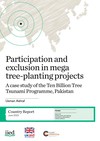Getting the politics right to grow the trees right
IIED and partners identified the conditions under which high-profile tree-planting campaigns might work – resulting in the right trees in the right places, with the right incentives for the right people to take care of them – in the context of post-COVID-19 recovery.

Women labourers tending to saplings in Haripur, Khyber Pakhtunkhwa, Pakistan (Photo: Zofeen Ebrahim)
For many, the impacts of COVID-19 land on top of severe social, economic and environmental stresses, including the increasing and bigger-than-COVID reality of high death rates and rising poverty related to climate change.
In the years leading up to the pandemic, tree-planting schemes gained popularity with governments, NGOs and the private sector alike as an effective means of addressing these stresses.
Planting trees appears to offer livelihoods generation and public health benefits, and promotes biodiversity and carbon sequestering among many other positive outcomes.
If and when such high-profile political and corporate pledging returns after COVID-19, or in response to COVID-19, might some of these schemes actually work? Might they contribute to healthier people, ecologies and local economies and in that sense help ‘kill COVID’?
What did IIED do?
As part of the 'Tree-planting campaigns in post-COVID-19 recovery' project, IIED’s forest team has worked with local partners in Ethiopia and Pakistan, two countries with recent examples of large-scale tree-planting initiatives, to attempt to answer these questions.
Through these two detailed country case studies and a broader research report incorporating several other significant cases, IIED has developed conclusions and guidance for institutions and programmes seeking to promote mass tree-planting initiatives, including:
- How to ensure genuine carbon positive results and claim accurately for them
- How to contribute to local biodiversity and avoid undermining it
- How best to generate both short and long-term employment and other social and economic benefits to communities, and
- How to avoid perverse results, such as land alienation.
One country report focuses on Ethiopia’s Green Legacy Initiative, and another highlights Pakistan’s Ten Billion Tree Tsunami Programme.
Supported by the UK Foreign Commonwealth and Development Office (FCDO), the Covid Collective is based at the Institute of Development Studies (IDS). The collective brings together the expertise of UK and Southern-based research partner organisations and offers a rapid social science research response to inform decision-making on some of the most pressing COVID-19-related development challenges.





